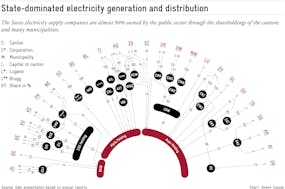Switzerland earns one in every two francs it makes through foreign trade. So open markets are a key part of the country’s economic success story. But recently, as the provision of health products during the Covid crisis has shown, the global trend has been towards isolation.
Having secured a free trade agreement with Indonesia, Switzerland must now push further in this direction, whether by sealing the institutional framework agreement sought by the European Union, resolving accusations of currency manipulation from the USA, or helping to determine the future of the World Trade Organization.
Take the framework agreement. Around half Swiss exports go to the EU and secure one million jobs domestically. But despite the obvious importance of unhindered access to the EU single market, Bern has over the past two years played for time in dealing with Brussels. The upshot is that not only the status quo is now threatened, no new sectoral agreements can be concluded either. That means for example, potentially greater disruption to electricity supplies in future because of the lack of a bilateral accord. A power shortage – as the government recently discovered – is one of the greatest risks for Switzerland. The health sector would also benefit from a bilateral agreement ahead of the next pandemic.

“Markets are like parachutes: they only work when they are open,” Helmut Schmit, former German Chancellor. (Emily Adams, Unsplash)
In November 2020, the Swiss government finally defined its position vis a vis the EU and submitted this to Brussels. Hopefully, it will be possible to resolve the open points with the EU and to have these accepted domestically (through a likely plebiscite). To this end, Switzerland could, for example, decide to evaluate the effects of the framework agreement after 10 years. Among the relevant criteria might be the economic effects and the development of formal and economic sovereignty.
Security of supply rather than self-sufficiency
But a second challenge looms. Washington has accused Switzerland of increasing its exports at the expense of American companies, adducing three factors, one being alleged currency manipulation.
Were Washington to escalate, the impact of possible economic sanctions affecting Switzerland’s second biggest export market could have significant repercussions for the estimated 260,000 Swiss jobs dependent on trade with the US. Former German Chancellor Helmut Schmidt once said: “Markets are like parachutes: they only work when they are open.”
Ensuring US market access and sealing a comprehensive economic agreement with Washington are therefore essential. They could create around 13,500 additional Swiss jobs – a welcome event in the current difficult economic climate.
Open markets – ideally secured by a dense network of free trade deals – also contribute to Switzerland’s security of supply. Diversifying sources of supply through established channels is preferable to attempting to raise self-sufficiency. Seen through this lens, the deal with Indonesia contributes to security of supply.
Bilateral agreements on preferential market access must be supplemented by a strong multilateral approach. Our country benefits greatly from the rules-based trading system of the World Trade Organization – legal certainty and open markets are the basis of our prosperity.
This article was published on March 2, 2021 on the platform “Die Volkswirtschaft”.





